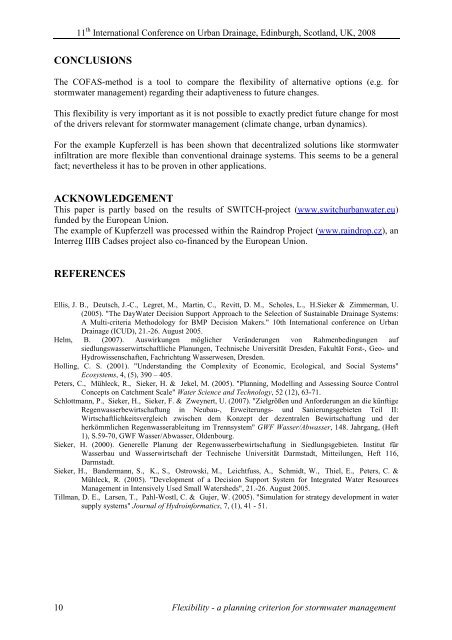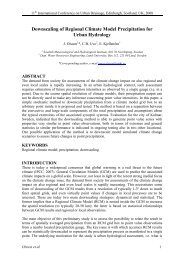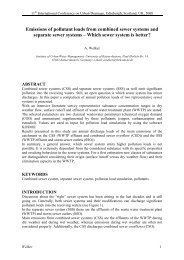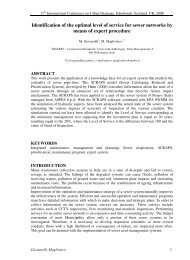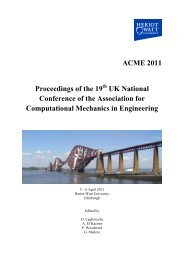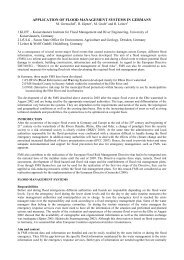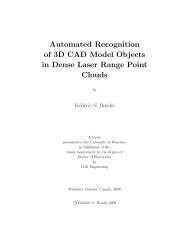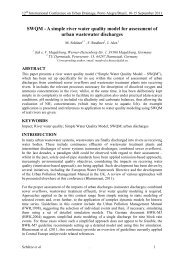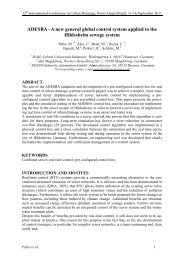Flexibility - a planning criterion for stormwater management
Flexibility - a planning criterion for stormwater management
Flexibility - a planning criterion for stormwater management
You also want an ePaper? Increase the reach of your titles
YUMPU automatically turns print PDFs into web optimized ePapers that Google loves.
11 th International Conference on Urban Drainage, Edinburgh, Scotland, UK, 2008<br />
CONCLUSIONS<br />
The COFAS-method is a tool to compare the flexibility of alternative options (e.g. <strong>for</strong><br />
<strong>stormwater</strong> <strong>management</strong>) regarding their adaptiveness to future changes.<br />
This flexibility is very important as it is not possible to exactly predict future change <strong>for</strong> most<br />
of the drivers relevant <strong>for</strong> <strong>stormwater</strong> <strong>management</strong> (climate change, urban dynamics).<br />
For the example Kupferzell is has been shown that decentralized solutions like <strong>stormwater</strong><br />
infiltration are more flexible than conventional drainage systems. This seems to be a general<br />
fact; nevertheless it has to be proven in other applications.<br />
ACKNOWLEDGEMENT<br />
This paper is partly based on the results of SWITCH-project (www.switchurbanwater.eu)<br />
funded by the European Union.<br />
The example of Kupferzell was processed within the Raindrop Project (www.raindrop.cz), an<br />
Interreg IIIB Cadses project also co-financed by the European Union.<br />
REFERENCES<br />
Ellis, J. B., Deutsch, J.-C., Legret, M., Martin, C., Revitt, D. M., Scholes, L., H.Sieker & Zimmerman, U.<br />
(2005). "The DayWater Decision Support Approach to the Selection of Sustainable Drainage Systems:<br />
A Multi-criteria Methodology <strong>for</strong> BMP Decision Makers." 10th International conference on Urban<br />
Drainage (ICUD), 21.-26. August 2005.<br />
Helm, B. (2007). Auswirkungen möglicher Veränderungen von Rahmenbedingungen auf<br />
siedlungswasserwirtschaftliche Planungen, Technische Universität Dresden, Fakultät Forst-, Geo- und<br />
Hydrowissenschaften, Fachrichtung Wasserwesen, Dresden.<br />
Holling, C. S. (2001). "Understanding the Complexity of Economic, Ecological, and Social Systems"<br />
Ecosystems, 4, (5), 390 – 405.<br />
Peters, C., Mühleck, R., Sieker, H. & Jekel, M. (2005). "Planning, Modelling and Assessing Source Control<br />
Concepts on Catchment Scale" Water Science and Technology, 52 (12), 63-71.<br />
Schlottmann, P., Sieker, H., Sieker, F. & Zweynert, U. (2007). "Zielgrößen und An<strong>for</strong>derungen an die künftige<br />
Regenwasserbewirtschaftung in Neubau-, Erweiterungs- und Sanierungsgebieten Teil II:<br />
Wirtschaftlichkeitsvergleich zwischen dem Konzept der dezentralen Bewirtschaftung und der<br />
herkömmlichen Regenwasserableitung im Trennsystem" GWF Wasser/Abwasser, 148. Jahrgang, (Heft<br />
1), S.59-70, GWF Wasser/Abwasser, Oldenbourg.<br />
Sieker, H. (2000). Generelle Planung der Regenwasserbewirtschaftung in Siedlungsgebieten. Institut für<br />
Wasserbau und Wasserwirtschaft der Technische Universität Darmstadt, Mitteilungen, Heft 116,<br />
Darmstadt.<br />
Sieker, H., Bandermann, S., K., S., Ostrowski, M., Leichtfuss, A., Schmidt, W., Thiel, E., Peters, C. &<br />
Mühleck, R. (2005). "Development of a Decision Support System <strong>for</strong> Integrated Water Resources<br />
Management in Intensively Used Small Watersheds", 21.-26. August 2005.<br />
Tillman, D. E., Larsen, T., Pahl-Wostl, C. & Gujer, W. (2005). "Simulation <strong>for</strong> strategy development in water<br />
supply systems" Journal of Hydroin<strong>for</strong>matics, 7, (1), 41 - 51.<br />
10 <strong>Flexibility</strong> - a <strong>planning</strong> <strong>criterion</strong> <strong>for</strong> <strong>stormwater</strong> <strong>management</strong>


